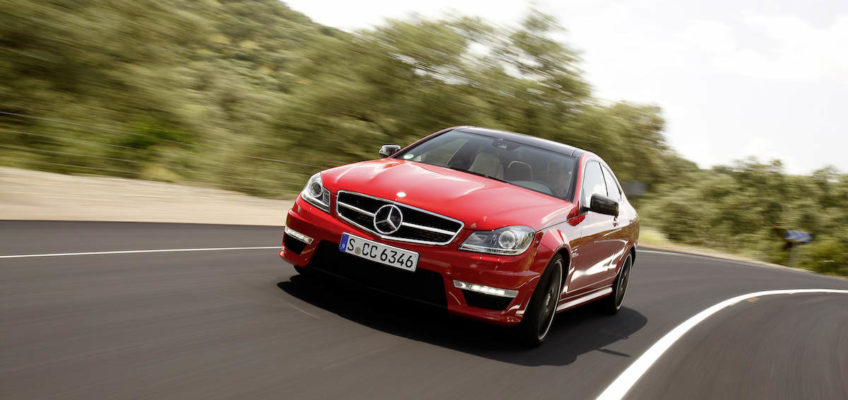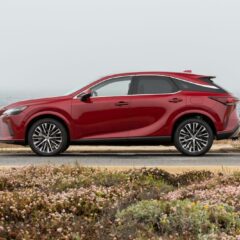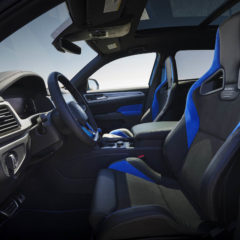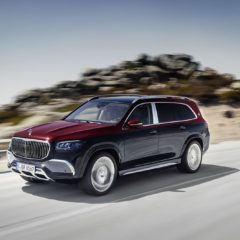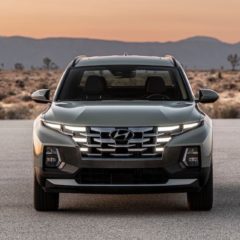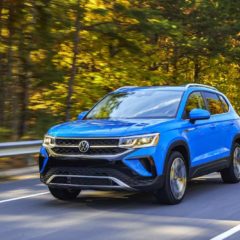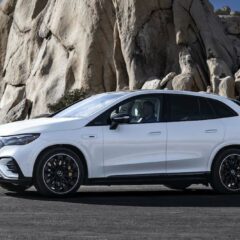- All newly launched architectures will be electric-only from 2025 onwards.
- In 2025 Mercedes-Benz will launch three electric-only architectures.
- Mercedes-Benz will be ready to go all electric at the end of the decade, where market conditions allow.
- Mercedes-Benz to install battery cell capacity of more than 200 Gigawatt hours with partners, plans for eight Gigafactories.
- New partnerships for development and production of battery cells in Europe.
- Efficiency of electric drivetrains to be enhanced through vertical integration and the acquisition of YASA, a specialist in ultra-high performance axial flux motors.
- Plug & Charge to introduce seamless charging without extra steps needed for authentication and payment. Mercedes me Charge to have more than 530,000 AC and DC charging points worldwide.
- Acceleration of electrification ramp-up marks a radical shift in capital allocation.
- Mercedes-Benz is committed to its margin targets – also in a BEV-world.
Mercedes-Benz is getting ready to go all electric by the end of the decade, where market conditions allow. Shifting from electric-first to electric-only, the world’s preeminent luxury car company is accelerating toward an emissions-free and software-driven future.
By 2022, Mercedes-Benz will have battery electric vehicles (BEV) in all segments the company serves. From 2025 onwards, all newly launched vehicle architectures will be electric-only and customers will be able to choose an all-electric alternative for every model the company makes. Mercedes-Benz intends to manage this accelerated transformation while sticking to its profitability targets.
To facilitate this shift, Mercedes-Benz is unveiling a comprehensive plan which includes significantly accelerating R&D. In total, investments into battery electric vehicles between 2022 and 2030 will amount to over €40 billion. Accelerating and advancing the EV portfolio plan will bring forward the tipping point for EV adoption.
Technology Plan
Architectures: In 2025 Mercedes-Benz will launch three electric-only architectures:
- MB.EA will cover all medium to large size passenger cars, establishing a scalable modular system as the electric backbone for the future EV portfolio.
- AMG.EA will be a dedicated performance electric vehicle platform addressing technology and performance oriented Mercedes-AMG customers.
- VAN.EA ushers in a new era for purpose made electric vans and Light Commercial Vehicles, which will contribute to emission free transportation and cities in the future.
Vertical integration: After reorganizing its powertrain activities to put planning, development, purchasing and production under one roof, Mercedes-Benz will deepen the level of vertical integration in manufacturing and development, and insource electric drive technology. This step includes the acquisition of UK based electric motor company YASA. With this deal, Mercedes-Benz gains access to unique axial flux motor technology and expertise to develop next generation ultra-high performance motors. In-house electric motors, such as the eATS 2.0, are a key part of the strategy with a clear focus on efficiency and the overall cost of the entire system, including inverters and software. China, the world’s largest new energy vehicle (NEV) market, which is home to hundreds of companies and suppliers specialized in EV components and software technologies, is expected to play a key role in accelerating the Mercedes-Benz electrification strategy.
Batteries: Mercedes-Benz will need a battery capacity of more than 200 Gigawatt hours and plans to set up eight Gigafactories for producing cells, together with its partners around the world. This is in addition to the already planned network of nine plants dedicated to building battery systems. Next generation batteries will be highly standardized and suitable for use in more than 90% of all Mercedes-Benz cars and vans while being flexible enough to offer individual solutions to all customers. With regard to cell manufacturing, Mercedes- Benz intends to team up with new European partners to develop and efficiently produce future cells and modules, a step which ensures that Europe remains at the heart of the auto industry even in an electric era. Cell production will give Mercedes-Benz the opportunity to transform its established powertrain production network. By continuously integrating the most advanced battery cell technology in cars and vans, Mercedes- Benz aims to increase range during the production lifecycle of a model. With the next battery generation, Mercedes-Benz will work with partners like SilaNano to further increase energy density by using silicon- carbon composite in the anode. This will allow for unprecedented range and even shorter charging times. When it comes to solid-state technology, Mercedes-Benz is in talks with partners to develop batteries with even higher energy density and safety.
Charging: Mercedes-Benz is also working on setting new standards in charging: “Plug & Charge” will allow customers to plug-in, charge and unplug without extra steps needed for authentication and payment processing. Plug & Charge will go live with the market launch of the EQS later this year. Mercedes me Charge is already one of the world’s largest charging networks and currently comprises more than 530,000 AC and DC charging points worldwide. Furthermore, Mercedes-Benz is working with Shell on expanding the charging network. Customers will get enhanced access to Shell’s Recharge network consisting of over 30,000 charge points by 2025 in Europe, China, and North America – including over 10,000 high-power chargers globally. Mercedes-Benz is also planning to launch several premium-charging sites in Europe, which will offer a bespoke charging experience with top-notch facilities.
Production Plan
Mercedes-Benz is currently preparing its global production network for electric-only output with the pace of the ramp-up designed to follow market demand. Thanks to early investments into flexible manufacturing, and the state-of-the art MO360 production system, Mercedes-Benz can mass produce BEVs already today. As soon as next year, eight Mercedes-Benz electric vehicles will be produced at seven locations on three continents. Furthermore all passenger car and battery assembly sites run by Mercedes-Benz AG will switch to carbon neutral production by 2022. To enhance manufacturing efficiency, Mercedes-Benz is joining forces with GROB, a German global leader in highly innovative battery production and automation systems, strengthening its battery production capacity and know-how. The cooperation focuses on battery module assembly as well as pack assembly. Mercedes-Benz also plans to install a new battery recycling factory in Kuppenheim, Germany, to develop and secure recycling capacity and know-how. Start of operations will be in 2023, depending on the outcome of promising discussions with public authorities.
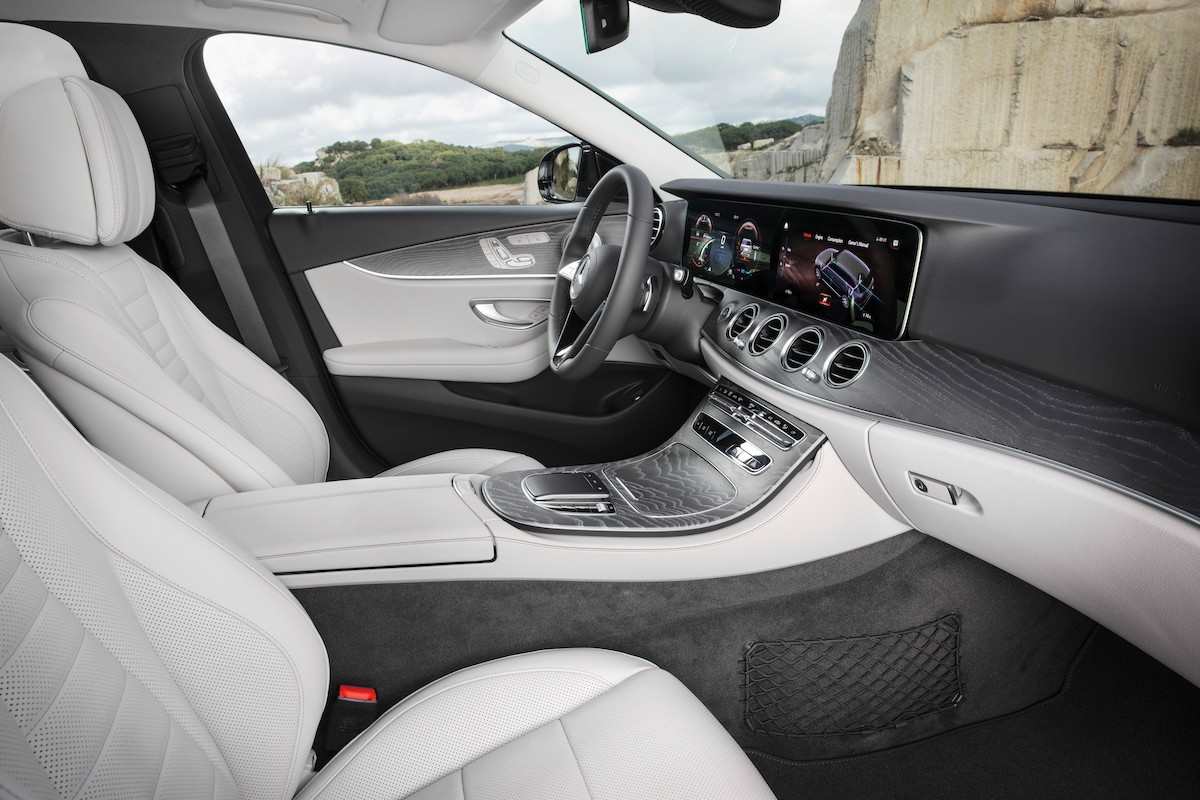
People Plan
The transition from internal combustion engines to electric vehicles is feasible and already underway at Mercedes-Benz. Working together with employee representatives, Mercedes-Benz will continue the transformation of its workforce, making use of extensive re-skilling schemes, early retirement as well as buyouts. TechAcademies will be offering colleagues training for future-oriented qualifications. In 2020 alone, about 20,000 employees in Germany were trained in aspects of e-mobility. To deliver on plans for developing the MB.OS operating system, 3,000 new software engineering jobs will be created worldwide.
Financial Plan
Mercedes-Benz remains committed to the margin targets outlined in fall 2020. Last year’s targets were based on the assumption of selling 25% hybrid and electric vehicles by 2025. Today’s reiteration is based on an assumed xEV share of up to 50% by 2025 and a market scenario for new car sales which in essence has switched to fully electric by the end of the decade. An important lever is to increase net revenue per unit by raising the proportion of high-end electric vehicles such as Mercedes-Maybach and Mercedes-AMG models, while at the same time taking more direct control over pricing and sales. Rising revenue from digital services will further support results. Mercedes is also working on further reducing variable and fixed costs and cutting the capex share of investments. Common battery platforms and scalable electric architectures combined with advances in battery technology, will bring higher degrees of standardization and lower costs. The proportion of battery costs within the vehicle is expected to fall significantly. Capital allocation is moving from EV-first to EV-only. Investments into combustion engines and plug-in hybrid technologies will drop by 80% between 2019 and 2026. On this basis, Mercedes-Benz projects company margins in a BEV world which are similar to those in the ICE era.
The post Mercedes-Benz prepares to go all-electric appeared first on AutomotorPro.com.
